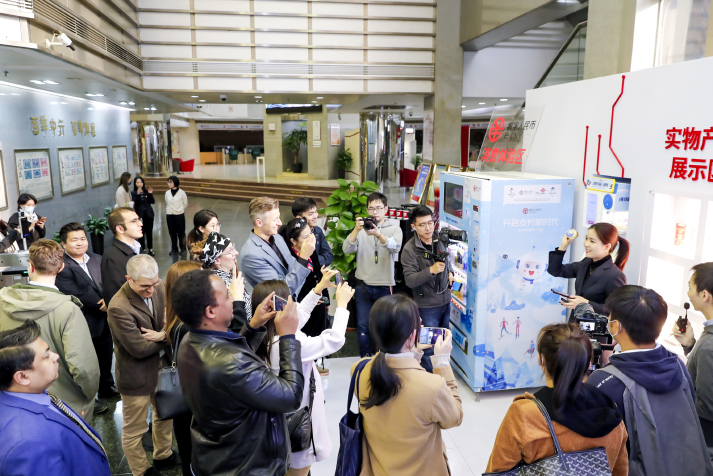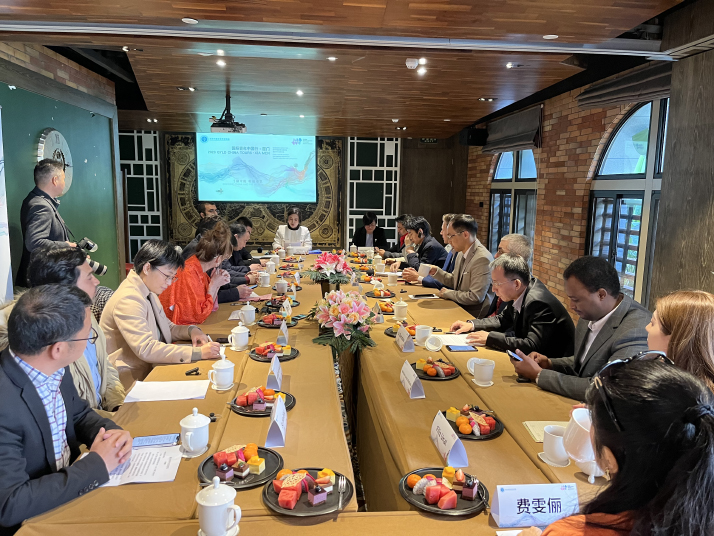| World |
| International youth decode Xiamen's development model | |
|
|
 Young global leaders visit the Bank of China Xiamen Branch to learn about the development of China's digital renminbi on February 25 (COURTESY PHOTO)
Despite Ilaf Elard, an associate professor of practice in economics at New York University Shanghai, China's first Sino-American research university, having sifted through extensive coverage of China's modernization efforts over the past four decades, some of the content still remained rather obscure. "Some concepts were a bit unclear and undefined. For example, that of the Special Economic Zone—or SEZ," the German scholar told Beijing Review, adding it was difficult to get, through just a handful of news snippets, a good grasp of how exactly an SEZ works. A recent trip to Xiamen City in coastal Fujian Province in southeast China proved enlightening. A group of international youth from about 10 countries visited the city from February 25 to 27 under the Global Young Leaders Dialogue (GYLD), a program that regularly takes international participants on tours of different regions across China to offer them the opportunity to gain a more in-depth understanding of the country. Elard was among them. The Xiamen SEZ was among China's first batch of four such zones—the other three being Shenzhen, Shantou and Zhuhai, Guangdong Province, serving as a pilot area for the country's reform and opening up since the late 1970s and early 1980s, and for promoting cross-Straits cooperation and exchanges, in addition to boosting the city's own economic growth. The State Council, China's equivalent of a cabinet, approved the establishment of the Xiamen SEZ in October 1980. Originally comprising a territory of 2.5 square km, today, it covers the entire city. SEZs in China are officially defined as "small geographical areas that allow foreign companies to have access to lower taxes and better economic conditions for their business." "The Chinese model of designating SEZs is one example of how China stimulates economic development and growth. In economics and economic research, we call this the 'developmental state,' that is, the state taking a big role in pushing economic growth forward. These designated areas help China open up to the rest of the world." Elard said when visiting the Xiamen SEZ Memorial Hall, a small museum introducing the zone's history. An urban upgrade Xiamen's opening up has been gaining momentum since the Xiamen Area of China (Fujian) Pilot Free Trade Zone (FTZ) was launched in 2015. FTZs are a subtype of SEZs where goods may be imported, handled, manufactured and exported without direct intervention from customs. Each FTZ in China has an industrial and economic focus, offering different incentives to fulfill its objectives. China set up its first pilot FTZ in Shanghai in 2013. After five rounds of expansion, the country now features 21 pilot FTZs echoing the country's pursuit of economic globalization, establishing an economic system in line with top-notch, international standards and lifting the country's ongoing reform and opening-up efforts to a higher level. Moving from SEZs to FTZs, China has evolved from providing preferential policies to organizing a group of selected tax enclaves and issuing uniform rules on market access across the country, Hu Jiaxiang, a professor of law at Shanghai Jiao Tong University's KoGuan Law School, wrote in his 2021 Handbook of International Investment Law and Policy. The difference between the original SEZ and an FTZ is that the latter's mission is to experiment with a given set of innovative rules as to widen market access, according to Hu. One of these rules is that the FTZ adopts a negative list approach toward foreign investment management. This list is a document that delineates industries that are prohibited or restricted to investment by foreign companies. Any industry not included on the list is presumed to be open to investment without requiring additional administrative approval, according to a staff member at the Big Data Operation Center of Xiamen Area of China (Fujian) Pilot FTZ. "The pilot FTZ is a pilot in the sense that you try to experiment with new regulations on a small scale. If that works, it can be copied or exported to other areas of China," the staff member told GYLD members. "China is very big, so you don't want to have very quick changes because there could be very negative consequences if it doesn't work," Elard elaborated with regards to the negative list. He further expressed his belief that the FTZs are very much in line with China's economic paradigm shift, from emphasizing quantity to focusing on quality. Openness and innovation are in the city's DNA, and its advantages in the digital economy and advanced manufacturing sector have given it the ability to sync up with international affairs. For example, by hosting the Ninth BRICS Summit in 2017, Xiamen was able to lift its cooperation with BRICS countries. The city launched the BRICS Partnership on New Industrial Revolution Innovation Center (BPIC) in December 2020. The BRICS countries, namely Brazil, Russia, India, China and South Africa, are home to over 40 percent of the world's population and account for about one fourth of the global economy. The BPIC intends to help BRICS countries pool ideas on how to best use new technologies, including artificial intelligence, big data and blockchain, and promote cooperation. For example, TPV Technology, a Xiamen-based company mainly engaged in the research and development (R&D), manufacturing, sales and post-sales services of LCD televisions and backlight modules, has set up manufacturing bases and R&D centers in St. Petersburg in Russia, Manaus in Brazil and Bangalore in India. In 2021, the company's exports to Brazil, Russia and India were worth approximately $180 million, $90 million and $60 million, respectively, and created over 2,400 local jobs. "The BRICS partnership provides a development model for the world," Md Misbahul Ferdous, the Director of Clinical Research at Lepu Medical Beijing and a Bangladeshi native, said. Once China has fully developed, it will benefit developed and developing countries alike, Elard added.  A salon discussing youth power in the process of modernization at Xiamen University in Xiamen City, Fujian Province, on February 26 (TAO XING)
Power to the youth Experts emphasized the importance of youth power in promoting mutual understanding and global friendship during a salon at Xiamen University on February 26. The salon was part of the GYLD tour. Xu Jingong, a leader of the university, stated during the meeting, "Transnational communication is an important way of promoting global friendship." The GYLD program is a prime example of a platform for young expats to understand China and exchange ideas with Chinese youth. "Young adults provide their knowledge to global development," Yu Yunquan, President of the Academy of Contemporary China and World Studies, a Beijing-based think tank that initiated the GYLD program, said at the meeting. He further expressed his hopes that the young global leaders would learn more about Xiamen's development experiences through this three-day tour. "Next time I read a news report about Xiamen, or about a Xiamen-related topic, I will take a greater interest given I've now actually visited the place," Elard said. Abdilahi Ismail Abdilahi, a Sinologist from Somalia who works at Beijing Foreign Studies University, told Beijing Review that "GYLD is an opportunity for us to learn more about Chinese culture. Every city, every province, has its own culture, so when I first came here (Xiamen), I thought: 'Amazing!' It's green, the weather is agreeable, the ecological environment… It's all great." "I will share what I've seen and heard here with my family and friends residing outside of China," he added. (Print Edition Title: Port of Call) Copyedited by Elsbeth van Paridon Comments to taoxing@cicgamericas.com |
|
||||||||||||||||||||||||||||
|
